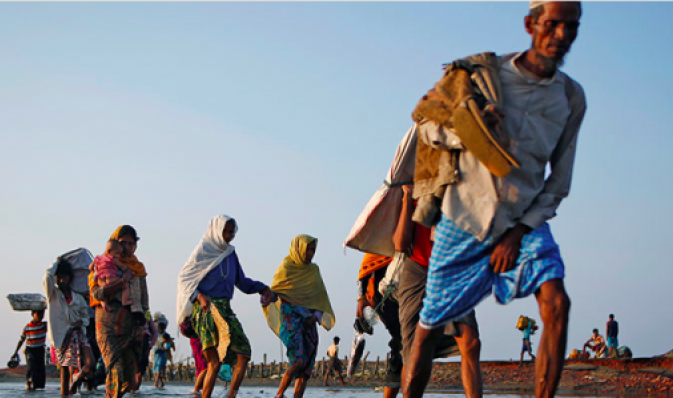
By THE IRRAWADDY
February 26, 2018
YANGON—A Myanmar delegation was blocked from joining an international genocide conference being held in Berlin to push European leaders to do more to help the beleaguered Rohingya.
The conference, which started on Monday, is being attended by international scholars, human rights activists and Rohingya lobbyists based outside of Myanmar. Participants include Yanghee Lee, the UN’s special envoy on human rights in Myanmar, who has been banned from returning to the country on the grounds that her reporting on the crisis in Rakhine State has been biased in favor of the Rohingya.
The eight-member group from Myanmar — who are part of the Strategies for Peace, Harmony and Development Workshop — comprised Dr Aung Tun Thet, the chief coordinator of the government’s Union Enterprise for Humanitarian Assistance, Resettlement and Development in Rakhine and Daw Pyone Kaythi Niang, an NLD lawmaker and member of the International Relations Parliamentary Committee as well as others from the private and public sectors.
The workshop was set up by the Ministry of Foreign Affairs-affiliated Myanmar Institute of Strategic and International Studies (Myanmar ISIS). Established in 1992 by the State Law and Order Restoration Council (SLORC) with the then minister of foreign affairs as its chairman, Myanmar ISIS was restructured in 2013 and is now run by members with foreign-service experience. As a research and policy analysis institute working on international relations and Myanmar foreign policy, it continues to exchange views with the Myanmar Ministry of Foreign Affairs while also engaging in track-II, or backchannel, diplomacy.
According to a press briefing organized by the members on Monday in Yangon, the objective of joining the conference in Berlin was to “listen and engage with the participants of the event.”
The group said all members had successfully registered on Thursday for the ‘Berlin Conference on Myanmar Genocide’ via the Eventbrite online platform and received confirmation that their registration had been successful with tickets being issued.
However, the members were informed via email at around midnight on Friday that their registrations for the conference had been cancelled, with the organizing team claiming they couldn’t offer the seats “due to overbooking of the event.”
Daw Pyone Kaythi Naing told the press conference on Monday that the members had hoped to attend the conference to get a better understanding and appreciation of external views.
The delegation members told the press briefing that they were disappointed to be denied the chance to participate in the conference as their attendance would have created a well-rounded audience that brought in independent voices. However, they now shared genuine concerns that the organizers of the Berlin conference had deliberately sought to exclude participants from Myanmar.
“This leads us to question the real intention behind this particular event as well as fuel our concerns that the conference will create more complexities, which in turn will be very counter-productive to finding a long-lasting solution for the people from all communities in Rakhine,” the members told the briefing.
Since Muslim militant attacks in August in northern Rakhine State last year, hundreds of thousands of Rohingya have fled to neighboring Bangladesh following the Myanmar military’s clearance operations. Myanmar has been internationally criticized for human rights abuses against the Rohingya. While the country categorically rejects that there is genocide taking place in the state, it had acknowledged that the situation in Rakhine is in dire need of attention and collaboration with all stakeholders.









